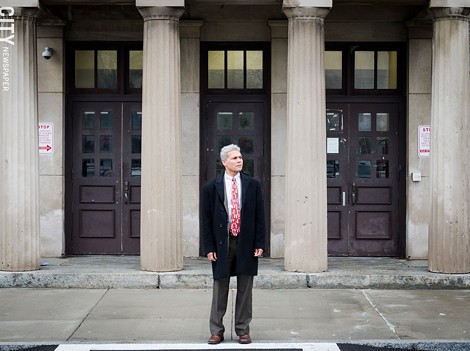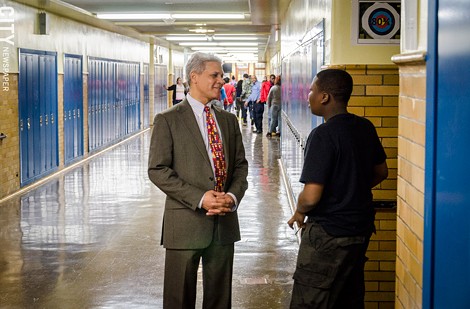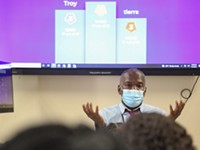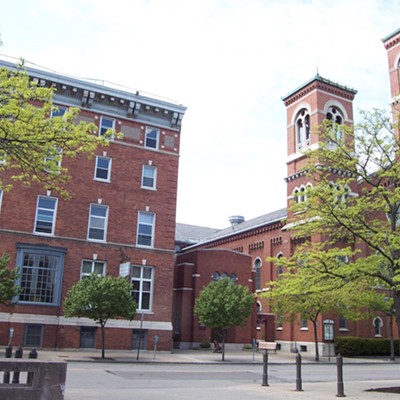[
{
"name": "500x250 Ad",
"insertPoint": "5",
"component": "15667920",
"parentWrapperClass": "",
"requiredCountToDisplay": "1"
}
]
Bolgen Vargas may be remembered as the superhero who figured out a way to reverse 30 years of declining student performance in the Rochester City School District. Or he could be remembered as another name on a long list of well-meaning superintendents ultimately bested by an ossified bureaucracy.
After two years leading the school district, Vargas said that he has come to a stark conclusion: the district is broken so badly that it can't be fixed from within. Blocking much needed reforms is a bureaucracy that's "stuck," he said, under its own weight.
At a school board committee meeting last week, Vargas presented members with both an admission and a proposal. He told members that the district's personnel have so many conflicting, often competing interests that no superintendent can overhaul the bureaucracy effectively. And he proposed turning as many of Rochester's schools as feasible over to local colleges to run by 2015.
Vargas said he acknowledges that the concentration of poverty in Rochester creates serious challenges for students and families. But that doesn't excuse a deeply-embedded district culture that pardons its own managerial failures, he said.
In an interview last week, an impassioned Vargas repeated some familiar themes. District officials are running out of time to turn around the long-ailing school system, he said, and a state takeover looms unless sweeping changes are made.
Vargas refuted reports that he proposed his college-run schools idea without having first getting support from the colleges' senior management. He said he has been in private talks with senior-level officials of several area colleges and that some are interested. Though he confirmed that one official was Anne Kress, president of Monroe Community College, he would not elaborate on the others or what they discussed. And before going any further, he said he needed to present the idea to the city school board.
Vargas said urgency is the driving factor in his decision to approach the colleges, and he cited numerous examples of managerial problems that are deeply rooted in a culture that defies change. And he listed daunting examples of government worker complacency, lack of common sense and initiative, and an ossification of old habits that wouldn't be tolerated by most private sector employers.
And though there have been countless proposals for fixing the district over the years, Vargas is convinced that the colleges are best suited to help improve city schools. In addition to having programs devoted to education, health, and management, Vargas said, the colleges are similar institutions with shared interests.
Vargas has been concerned about the growing number of charter schools in Rochester and their adverse impact on the district's enrollment. And he told school board members that the colleges that run city schools would have a financial advantage over new charter schools.
While the charter schools only receive the state's per pupil aid, he said, the colleges would benefit from federal, state, and local funding. And they could access the district's building improvement funds, Vargas said.
Any plans to take over city schools would require the approval of the Rochester school board and the State Education Department, and the institutions would be given the full authority of the superintendent over the participating schools.
Vargas said there isn't one off-the-shelf model for what a school would be like under college control. He said his message to the senior management at the colleges is: everything is on the table, including labor agreements.
But this is where things start to get dicey. For one, salaries, benefits, and due process — managing employee corrective actions and terminations — negotiated in union contracts cannot be changed. And the colleges may have second thoughts when they see how cumbersome and difficult it can be to fire an ineffective teacher.
And there are other concerns. Some of the area's colleges have their own managerial challenges. And some of their education faculty members are outspoken opponents of certain federal and state-mandated requirements such as standardized testing and the new teacher evaluations. Why would they agree to take responsibility for education regulations they oppose?
But at the very least, Vargas's proposal will cause some of his critics to question why he hasn't negotiated more favorable union contracts himself. And is he simply deferring the tough job of a management shakeup to other entities?
Vargas flips those questions around. Instead of saying he has all of the answers, he has asked for help.
Asking the college community for assistance in solving a problem that has impacted the entire region for years is the right thing to do, he said.
The following is an edited version of City's interview with Bolgen Vargas.
CITY: What drove your decision to propose that area colleges should manage city schools? What examples, research, or advice did you rely on that made you think this is a good idea?
Vargas: The number-one driver for this is the sense of urgency. We don't have time to lose. And after two years on this job, I came to the conclusion that the bureaucracy is so overwhelming. You hear that even from our colleges and universities, who tell me it is very difficult to do business with us.
We have to change that. We have to be a more flexible, more responsive organization to the needs of our students and families.
In terms of examples and research, there's a long history of colleges running K-12 schools.
In the SUNY system you have the Lab Schools that were run by them. SUNY Geneseo had a Lab School. And today you find college-run schools across the nation. You find them in New York City, which is probably the best example. And now Buffalo is working with Johns Hopkins University.
This is not a new idea. We have 19 colleges in the Rochester community, all with rich capacities that could help us tackle some really difficult challenges. Their interests and our interests are interconnected.
They keep saying that our students have to spend a lot of time in remediation, and they do. So what if we were to do the work of educating students well early? And they could help us do that, and if they did, that money that they invest in remediation could go to better use.
You're talking about Lab Schools, but aren't their teachers and principals hired by the college or university? And that's not what you're talking about.
Here's what I'm proposing. The teachers would be part of the current [Rochester school district] work force. The college or university would have that pool [of employees] to work with.
And the same thing is true for the principals. They would either come from the current work force or the traditional way we recruit principals. Or the colleges and the universities may have principals in their systems that want to be part of something innovative.
We are constantly recruiting new principals because we have people who retire or move away, and we would give the colleges the same latitude. The state law allows the college or university to take full responsibility for managing the schools.
Let's create an example. We'll call it School 79 and say that you've got 40 teachers, a principal, and a vice principal. Johns Hopkins takes it over. Do they inherit the staff or do they pick their own staff? Will the staff come from the RCSD, and will people have to apply? Is the principal at School 79 out of a job, and must he or she re-apply?
It could be all of the above.
The first thing that the university and I need to do is enter into an agreement. Johns Hopkins' president could say to me: "Here are the parameters. And by the way, I don't like the current union contract. It's too inflexible."
Adam [Urbanski, Rochester Teachers Association president] and I negotiated a contract that allows me to say to [Johns Hopkins'] president that there are only three things that I cannot negotiate: salary, benefits, and due process.
Adam will say to you, understandably so, that there is flexibility. I could come to him and take advantage of that. But I have a bureaucracy that is entrenched and I've had difficulty moving us toward taking advantage of that flexibility even though there are great benefits.
Adam will tell you that the contract is revolutionary [because it does offer some flexibility]. But it's kind of like having a lot of wealth and resources, but not utilizing them well.
What I'm saying is: for whatever reason, the bureaucracy is stuck.
Can you be more specific about what you mean by the bureaucracy?
All I can tell you is that despite their needs, our students have had the least amount of instruction [and the highest need in the region] for a very long time. It took me two years to expand the time, and by some accounts that was fast.
It took me 15 months to get [free] parking for parents downtown [at central office]. If we want them to be engaged with us, it's important to make things easier for them, particularly when we have families who are struggling to put bread on the table.
You're talking about a bureaucracy as if that's a bunch of people and we don't have to think about who they are. Where is the obstruction coming from? Is it coming from teachers, principals, central office, or everywhere? Who is not taking advantage of the flexibility in the contract that you referred to earlier?
To answer that would require taking a half an hour to explain the culture of the organization. Even the most visible problems are invisible to that bureaucracy.
What do I mean by visible things? Visible things are the least amount of instructional time for our students, making sure that our children have the right textbooks in their hands in September — not in late October. Making sure that our children have art, music, drama, sports, and extracurricular activities.
When you go to some of our buildings, there's not even a welcome sign for parents. And we've been talking about parental engagement for how long? Just to change the sign to say "Welcome" is a struggle.
It's not that the people are bad people. But if you were to raise the question and ask, "Why is this so hard?" they'll tell you, "This is the way we've always done it for a very long time, and this how we will continue to do it."
I was at Wilson [Commencement Academy] and Patty [Malgieri, chief of staff ] was with me and I say that because she witnessed it, too. It's not like I'm going crazy. I look over and see a significant amount of textbooks in the library. I could tell they were classroom textbooks for biology. This was in October, close to November. So I ask: "What are all of these books doing here?" I have my meetings with parents, and I hear all of this concern about textbooks.
The person said to me that the textbooks were supposed to be delivered to the biology class. And I say we are about two months into the school year. Why don't the children have their textbooks? Did they just get here?
The person tells me, "No, they've been here for some time, but we don't have a textbook clerk."
I said, "Are you kidding me?"
What's wrong with getting 20 kids to bring them down to the class?
Do you see now what I mean when I say we are stuck?
Let me give you another example. An education institution should know how many students come to school every day. When I first arrived, I couldn't even get that.
Some of our teachers and administrators were like, "Well, that's how we do business here." It took [Rochester mayor] Tom Richards to help me with this. He said that the city would help us with the truancy problem with a couple of conditions. He said at the end of the day, we need to know for sure how many kids aren't there and who they are. And if we say they are there, we need to know for sure that they are.
When you have a system that doesn't even take attendance as seriously as it should, you have serious problems.
I had one principal who had a number of students that hadn't come to school for a year or more, but still wanted us to allocate more dollars for their budget. And I said, "We will when we find the kids."
There was a day last spring when 25 percent of teachers weren't there, and we put out a note that day saying "25 percent of you aren't here today. What's going on?"
I said to people, I want to understand this. When 25 percent of the work force isn't there, this system can't work. We can't have 3,000 kids not attending school on a given day. And we can't have 25 percent of the work force not there.
Believe me, poverty isn't an excuse for an institution like the district to say that we can't count or keep track of the students who are not there. I'm not trying to blame anyone, but I think we have a system that for too long developed a culture that reached a certain comfort level.
Yes, we have teachers and principals that are working hard every day, who struggle every day to do extraordinary things under difficult circumstances. But we have a culture in place that doesn't in my view support students, families, teachers, or the people who work there.
But what makes you think that the colleges would be able to negotiate contracts with better terms? It's not as if they don't have bureaucracies of their own.
They have less layers. I have 64 campuses. They [colleges and universities] have expertise, knowledge, and resources. They have a track record running a similar educational institution. Remember they have accounting, medical, nutrition, and food services, too.
Take the University of Rochester; imagine the tutoring services they could provide. Imagine if students had a card to their libraries.
And by the way, they wouldn't have to spend an extra dollar to run the school because the financing would be provided by us. And they have the power to do better fund raising.
Keep in mind that there are people who aren't willing to invest in us, but they will invest in the UR. The opportunities are enormous.
They also have the Warner School of Education where they train teachers, and guess what? I have a significant shortage of teachers in math, science, and chemistry. I have teachers in essential areas that don't have the required certifications. They can help us by making sure that we have a well-trained, highly skilled work force.
Go into more detail about the financing, because you're saying that this won't cost the colleges and universities anything.
With charter schools, the only money that follows the student is state aid. In this case, the state, local, and federal dollars will follow. And the colleges will have the capacity to do their own independent fund raising, approaching foundations, and applying for their own grants.
The colleges and universities will also have the capital money or building aid, which is enormous. By 2022, we [RCSD]will be spending over a billion dollars. And there is accountability built into this. The colleges and institutions will enter into a five-year contract with some clear parameters. And those parameters have to include how they will meet the needs of our students, as measured by student achievement.
Would there be any restrictions to prevent the colleges and institutions from doing what charters are often accused of doing, such as creaming the best students off the top and getting rid of kids who don't function well or misbehave?
We have students with special needs, and not all of our schools are equipped to handle that, so we will be very specific about how those concerns will be addressed.
Also, we have a bilingual program, so we won't insist that they have one unless their plan was to call for that.
A lot depends on the mission of the school. What is the purpose of the school? If the mission is to create a very technically rich school with emphasis on math and science, and they want to use capital funding to redesign their school, we would consider that.
Or let's say they tell me that they don't want anything to do with our curriculum department and they want to write their own curriculum; they could do that as long as it is approved by the state.
And let me just say that there won't be one plan. If I get five colleges, there may be five different agreements and plans, because the mission for the schools may differ. For example, the U of R may say we want to take Wilson because we want to help strengthen that neighborhood, which is part of our community.
But could they kick kids out who are not special-needs kids and are just misbehaving, disruptive, and not doing the work?
It fascinates me that we hear this about charter schools all the time. But there are ways under the law that we [traditional public schools] kick kids out, too. When you suspend kids, you are kicking them out.
Now there are situations under the law when you have to suspend kids. So yes, the colleges and universities will be able to, the same way we can. And by the way, the commissioner and the board of education will not let me enter into an agreement that allows them to kick kids out illegally.
Education at the elementary and high school level is a right, not a privilege. Even when you kick a kid out, you still have to provide instruction. Right now we have about 1,800 students every year who are in prison and we still provide them with instruction.
The district will work with any college just like we have to work with any of our schools.
Would the colleges and universities have the right to fire a principal or teacher the same way they do now under existing contracts with the teachers union and the supervisors union?
Yes.
So they wouldn't have more leeway. You're not saying they are out from under the union contracts. What about seniority? Isn't that built into the contracts?
It is, but there are ways that the district and college can work together. The bumping right [that accompanies seniority], that's something I have expressed an interest in changing with the union.
This bumping of teachers from one building to the next creates instability, and we need a stable environment.
Critics would say that the due process piece is what holds up corrective actions and it can take two years to fire an ineffective teacher. Why would the colleges agree to that?
That's not necessarily true. For example, I was presented with a number of teachers and principals with tenure recommendations who never had a single evaluation. The number-one goal here is strengthening the management of the system to prevent things like this from happening.
Adam will tell you that you can do all of this right now, and he's right. And I am perplexed by that; why don't we do it? And that's where the colleges and universities can do a good job; after all, they trained many of the people who hold these jobs.
When you made your presentation to the board, you said that you had talked with the senior management of some of these schools and they showed interest. But a recent Democrat and Chronicle article implied that other than Anne Kress, president of Monroe Community College, many administrators at the other institutions didn't sound like they knew anything about this.
The facts are that I had discussions with several college leaders and I've been trying to meet with more. I can't talk to all 19 at once.
But before this thing went too far, I also needed to present the idea to my board. If the board had said that this is not a good idea, then why bother going further?
It's not that I'm trying not to be transparent here, but there have been private conversations that I've had that haven't been made public because while they may want to work with us, they also have similar challenges to work through. They have boards, too.
And this is only the exploratory stage.
School board member Cynthia Elliott raised a question that a lot of people are going to ask: Are you saying that this district can't manage and can't educate its students? And are you abdicating your responsibility and shifting it to some other entity?
It is my realization that we need help, and we need all the help we can get. And colleges and universities could provide some of the best help, because they are very strong institutions.
At the end of the day, I'm doing everything I can to change the bureaucracy. I'm not criticizing or blaming anyone. But I am, along with my team, trying to change it. We're trying to work with the entire community to challenge this system to be more flexible and responsive to the needs of our children, to break away from being stuck.
Are we surrendering? No; we're asking for help.
Will you pick the schools that will participate?
So many of our schools need help; it's not like I have just a few. I wish all 19 colleges would show up, and if they did, I would give them the list: "Here it is, help us."
But I wouldn't be open to someone saying, "Let me take School of the Arts." What kind of help is that to us?
Would issues like seniority and selecting the schools require 80 percent of the teachers in those schools to approve the college's plan before it can go forward? (Some changes can be made to the RTA contract if 80 percent of teachers at a given school agree.)
Ideally, we would prefer that. But remember, the law allows the superintendent to take several different approaches to improve failing schools. I prefer not to close schools with the whole thing of phasing out and phasing in new schools.
But I have to come up with solutions. I can't just say that is a bad idea and I don't want to do it.
The law allows for me to apply the transformational model, and I'm committed to the transformational model, which permits me to engage the colleges and universities as outside partners. I want to be clear that is my preferred approach.
But at the end of the day, if people don't agree to the transformational model, I can't go to the [state education] commissioner and say "I don't have a solution." He'll tell me, you still have other alternatives. [One alternative: the turnaround approach requires firing and replacing at least half of the current professional staff].
I had a situation last summer over a summer learning program where only 70 percent of the teachers agreed to the plan. Adam was helpful in helping me get to the 80 percent. But I say to people, please don't put me in a situation where I have to make that decision [to use the turnaround approach].
I'm willing to work with teachers and principals who don't want to work in a particular school. The system is large enough where they can go into another school.
I want to collaborate on the solutions to our problems. That's in my nature. But at the end of the day, collaboration is not sufficient if it can't change anything. We can collaborate all day long and never get to where we need to be.
Speaking of...
Latest in News
More by Tim Louis Macaluso
-

RCSD financial crisis builds
Sep 23, 2019 -

RCSD facing spending concerns
Sep 20, 2019 -

Education forum tomorrow night for downtown residents
Sep 17, 2019 - More »
More by Mary Anna Towler
-

Police reform: advocates on what should come next
Oct 22, 2019 -

Court clears the way for Police Accountability referendum
Oct 17, 2019 -
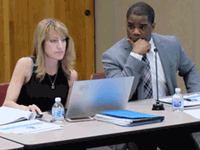
Dade outlines initial actions on district deficit
Oct 9, 2019 - More »

